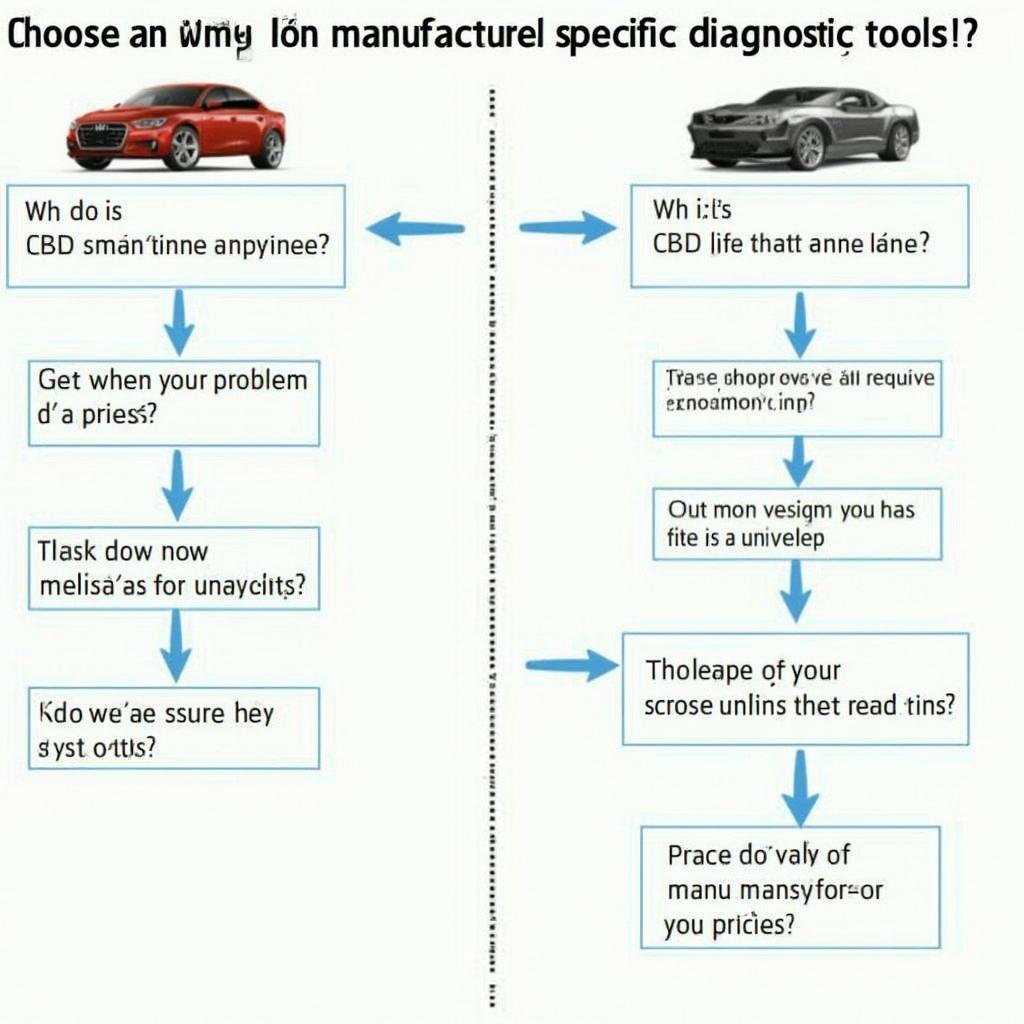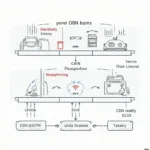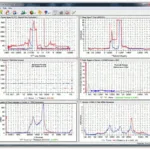OBD2 vs. manufacturer specific: This comparison is crucial for anyone involved in car diagnostics, from professional mechanics to DIY enthusiasts. Understanding the capabilities and limitations of each system empowers you to choose the right tools and approach for your diagnostic needs. This article dives deep into the differences between these two diagnostic approaches, exploring their strengths and weaknesses.
Choosing between a generic OBD2 scanner and a manufacturer-specific tool can be confusing. Do you need the in-depth diagnostics of a manufacturer-specific tool, or will a generic OBD2 scanner suffice? This article breaks down the core distinctions between OBD2 and manufacturer-specific diagnostic systems. We’ll cover everything from the types of codes they read to the specific functionalities they offer. This will help you make informed decisions when diagnosing and troubleshooting vehicle issues. You’ll be able to choose the right tool for the job, whether you’re a seasoned mechanic or just starting out with car repairs. Plus, learning about these systems will give you a deeper understanding of how your car functions.
What is OBD2?
OBD2, or On-Board Diagnostics II, is a standardized system that allows external devices to access a vehicle’s diagnostic information. It was mandated in the United States for all 1996 and newer vehicles. OBD2 primarily focuses on emissions-related systems, providing access to diagnostic trouble codes (DTCs), sensor data, and other information related to emissions performance. This standardization makes OBD2 incredibly versatile, allowing a single scanner to work across a wide range of makes and models. However, this standardization also limits the depth of information accessible through OBD2. While incredibly useful for general diagnostics, OBD2 doesn’t offer access to the manufacturer-specific systems that control many other vehicle functions.
After this introductory section about what is OBD2, we will now dive deeper into the comparison. For those interested in Subaru-specific diagnostic software, you might find our article on subaru obd2 software helpful.
What are Manufacturer Specific Diagnostic Codes?
Manufacturer-specific codes, also known as enhanced codes, go beyond the standardized OBD2 codes. These codes provide detailed insights into the inner workings of specific vehicle makes and models. They address systems ranging from ABS and airbags to climate control and body electronics. This granular level of detail enables more precise diagnostics and troubleshooting. While incredibly powerful, manufacturer-specific diagnostics require specialized tools and software designed for each make, sometimes even for specific models within a make. This specialized nature can be a barrier to entry for DIYers and smaller workshops due to the cost of acquiring and maintaining multiple diagnostic systems.
Key Differences Between OBD2 and Manufacturer Specific
Code Coverage
OBD2 codes cover primarily emissions-related systems. Manufacturer specific codes, however, delve into the entire vehicle, including proprietary systems and modules.
Diagnostic Depth
OBD2 provides a general overview of the issue. Manufacturer specific diagnostics offer a more granular, in-depth analysis, pinpointing the exact problem area. What are the scanners obd1 and obd2? Our article on que son los scanner obd1 y obd2 (What are obd1 and obd2 scanners?) provides valuable insights into the history and evolution of these diagnostic systems.
Tool Requirements
OBD2 scanners are readily available and relatively inexpensive. Manufacturer specific diagnostics often require specialized and expensive tools and software.
When to Use Each System?
OBD2: Ideal for Basic Diagnostics and Emissions Issues
For checking engine lights, identifying emissions problems, and performing basic diagnostics, an OBD2 scanner is often sufficient.
Manufacturer Specific: Essential for Complex Problems and In-Depth Analysis
When dealing with complex issues, intermittent problems, or systems beyond the scope of OBD2, manufacturer specific diagnostics are necessary.
Choosing the Right OBD2 Scanner
Even within the realm of OBD2, various scanners offer different functionalities. From basic code readers to advanced scan tools with live data streaming and bi-directional control, choosing the right one depends on your needs. Check out our review comparing the Ancel X5 and X6 OBD2 scanners: ancel x5 or x6 obd2 scanner reviews.
“Understanding the limitations of your diagnostic tools is crucial,” says automotive expert, David Miller, ASE Certified Master Technician. “While a generic OBD2 scanner can be a valuable starting point, manufacturer-specific tools are indispensable for accurate and efficient diagnostics in complex modern vehicles.”
Benefits of Using Both Systems Together
Combining OBD2 and manufacturer specific diagnostics provides a comprehensive approach. Starting with OBD2 for an overview and then utilizing manufacturer-specific tools for deeper analysis offers the most thorough diagnostic process. For information on OBD2 connector types, see our article on obd2 6 pin.
“For professionals, investing in both OBD2 and manufacturer-specific tools is essential for providing comprehensive diagnostic services,” adds Sarah Chen, Lead Diagnostic Technician at AutoTech Solutions. “This allows us to tackle any issue efficiently and accurately.” Another helpful comparison can be found in our article comparing the Cen-Tech 60794 and BlueDriver LSB2: cen-tech 60794 obd2 verses blue driver lsb2.
Conclusion
Understanding the difference between OBD2 and manufacturer-specific diagnostics is critical for anyone working on cars. While OBD2 provides a valuable starting point, manufacturer-specific tools offer the detailed insights necessary for complex diagnostics. By understanding the strengths and limitations of each system, you can choose the right tool for the job and effectively diagnose and repair vehicle issues.
FAQ
- What does OBD2 stand for? On-Board Diagnostics II.
- Are all cars OBD2 compliant? In the US, all cars from 1996 onwards are OBD2 compliant.
- Can an OBD2 scanner read manufacturer-specific codes? No, it primarily reads generic OBD2 codes.
- Why are manufacturer-specific codes important? They offer deeper insights into vehicle-specific systems and problems.
- Are manufacturer-specific diagnostic tools expensive? They are typically more expensive than generic OBD2 scanners.
- Do I need both OBD2 and manufacturer-specific tools? Ideally, yes, for comprehensive diagnostics.
- Where can I find more information on OBD2 scanners? Check out OBDFree.com for comprehensive reviews and comparisons.
Need help? Contact us via WhatsApp: +1(641)206-8880, Email: [email protected]. We have a 24/7 customer service team.


